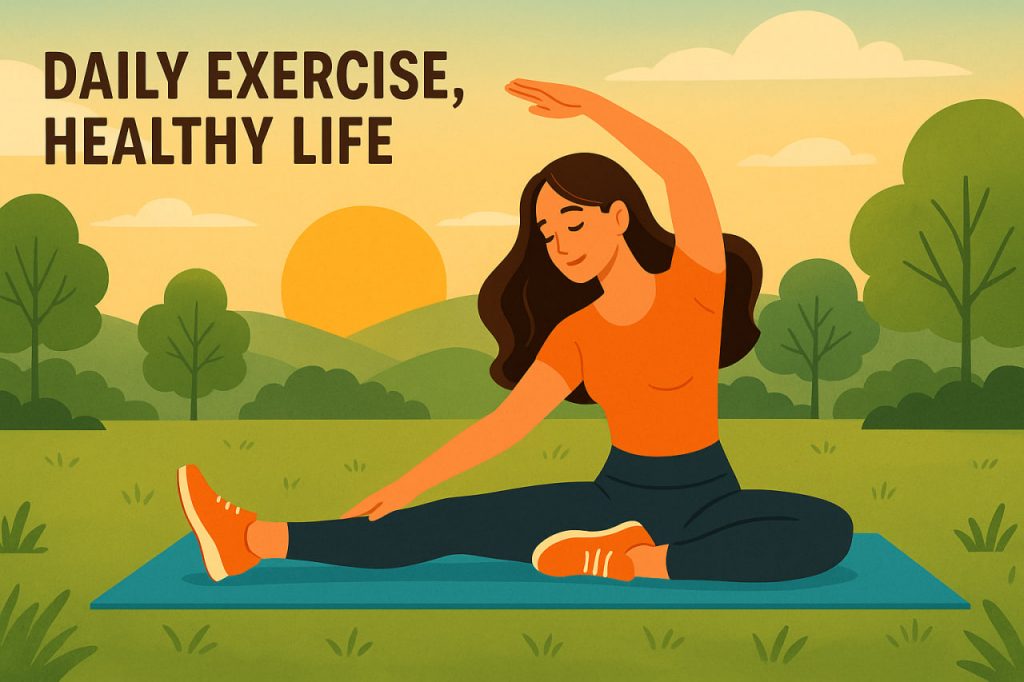Daily exercise is one of the most effective ways to maintain a healthy body, a strong mind, and emotional balance. Even short, consistent workouts can significantly improve quality of life, increase energy levels, and reduce the risk of chronic diseases. While modern lifestyles often involve long hours of sitting and screen time, making physical activity a daily habit helps counteract these negative effects. Exercise is not only about building muscle or losing weight—it’s about supporting the body’s natural functions and promoting long-term wellness.
The Physical Benefits of Daily Exercise
Regular physical activity strengthens the cardiovascular system, enhances muscle tone, and supports bone density. It improves blood circulation, lowers cholesterol, and helps regulate blood sugar levels. Exercise also increases oxygen flow to the body’s tissues, improving stamina and endurance. According to fitness expert Dr. Martin Keller, “Daily exercise doesn’t need to be extreme—consistency is far more powerful than intensity. Even a brisk 30-minute walk can reduce the risk of heart disease and diabetes.” Activities such as stretching, yoga, or light resistance training maintain flexibility and joint health, preventing injuries as the body ages.
Mental and Emotional Well-Being
Exercise has profound effects on the brain. It stimulates the release of endorphins, often called “happiness hormones,” which elevate mood and reduce stress. Physical activity also boosts dopamine and serotonin, neurotransmitters responsible for motivation and emotional stability. Research shows that daily movement can lower symptoms of anxiety and depression by up to 40%. Furthermore, regular workouts improve memory, focus, and sleep quality. Psychologist Dr. Elisa Nori notes, “Movement is medicine for the mind. It helps regulate emotions, enhances confidence, and gives people a sense of purpose.”
Boosting Immunity and Longevity
Consistent exercise strengthens the immune system by promoting healthy circulation and supporting the production of immune cells. It reduces inflammation, which is linked to many chronic conditions such as arthritis and cardiovascular disease. Studies have found that people who exercise daily tend to live longer and experience fewer age-related health problems. Light activities such as walking, cycling, or swimming can extend lifespan by maintaining optimal body function. Moreover, exercise helps the body regulate hormones that influence appetite and metabolism, supporting healthy body weight.
Daily Exercise and Lifestyle Balance
Incorporating daily exercise into a busy schedule is easier than it seems. The key is moderation and regularity—doing small, achievable routines rather than sporadic intense workouts. Simple actions such as taking the stairs, stretching during work breaks, or cycling to work can make a meaningful difference. Many health experts recommend combining aerobic exercises (like jogging or swimming) with strength training and flexibility work for a balanced fitness routine. Morning workouts boost energy for the day, while evening exercises help relieve tension and promote relaxation.
Social and Community Benefits
Exercise can also strengthen social connections. Joining group workouts, sports teams, or community fitness classes fosters a sense of belonging and accountability. Social exercise helps combat loneliness and encourages positive habits through shared motivation. Outdoor activities, such as hiking or cycling with friends, combine the benefits of movement with nature’s healing effects. For families, exercising together creates healthy traditions and strengthens emotional bonds, proving that fitness can be both enjoyable and unifying.
Common Myths About Daily Exercise
A common misconception is that daily exercise must be strenuous or time-consuming. In reality, short and moderate workouts performed consistently are more sustainable and beneficial than occasional high-intensity sessions. Another myth is that exercise only benefits young people—however, physical activity is crucial at every age. Even seniors can improve balance, bone health, and mobility through regular gentle exercises. What matters most is listening to the body and maintaining consistency.
Interesting Facts
- Just 30 minutes of brisk walking daily can reduce heart disease risk by 40%.
- Regular exercise increases brain volume in areas related to memory and learning.
- People who exercise daily are up to 50% less likely to develop depression.
- Exercise improves sleep quality by regulating circadian rhythms.
- Strength training after age 40 can reduce muscle loss and improve longevity.
Glossary
- Cardiovascular system — The network of the heart and blood vessels that circulates blood throughout the body.
- Endorphins — Natural hormones released during exercise that promote feelings of happiness and reduce pain.
- Serotonin — A brain chemical that helps regulate mood, sleep, and appetite.
- Metabolism — The body’s process of converting food into energy.
- Flexibility — The ability of muscles and joints to move freely through their full range of motion.


